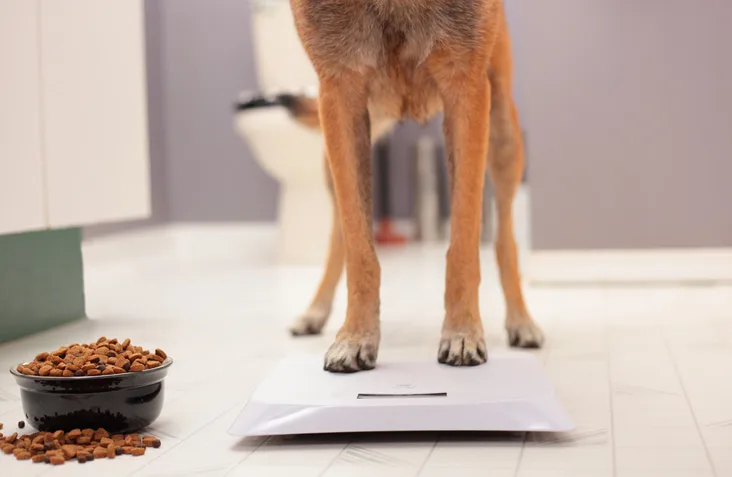You want your golden retriever to stay as healthy as possible, and this includes monitoring your dog’s weight. Dogs can avoid numerous health issues by staying at their goal weight. Becoming overweight can raise blood pressure, increase the risk of heart disease, hurt joints and damage liver function.
How much should a golden retriever weigh? If you are a first-time golden retriever owner, you may also wonder how big your dog will get. We have the answers for you in this guide to golden retrievers’ ideal weight.
What Is a Healthy Weight for a Golden Retriever?
The biggest factor in your golden retriever’s weight is sex. The average size for golden retrievers is:
- 55 to 65 pounds for females.
- 65 to 75 pounds for males.
Male dogs tend to be an inch or two taller than female dogs that can grow up to 22.5 inches.
Your dog has a long way to grow from birth. Newborn golden retrievers weigh only about a pound. By the time they reach eight weeks — when they are ready to separate from their mothers — they may only weigh 10 pounds. When your puppy reaches adolescence, around eight months, it will be almost full-sized, weighing about 50 pounds.
Puppies hit their full height between nine and 12 months. Their body size increases by up to 10% per week as they develop, and most stop gaining weight by the time they hit 18 months.
What Influences a Golden Retriever’s Weight?
Your golden retriever’s weight depends on more than how much puppy chow you feed it. As with humans, a few factors play into golden retrievers’ weights, including:
- Genetics.
- The age they were spayed or neutered.
- Lifestyle, meaning how active or inactive they are.
A dog with an active lifestyle will burn more calories. However, overexercising your golden retriever can accelerate the development of joint problems. Orthopedic issues are common among big dogs such as golden retrievers and may also impact how much exercise your dog can enjoy.
Why Do Golden Retrievers Struggle with Weight?
According to the Association for Pet Obesity Prevention, more than 60 percent of Golden Retrievers are considered overweight or obese. The Morris Animal Foundation further built upon this by conducting a research program dedicated to better understanding why Golden Retrievers struggle with obesity more than other breeds.
The Golden Retriever Lifetime Study followed the lives of over 3,000 pups. It took a close look at the behavioral trends, environmental considerations, and health records of participants in order to identify canine risk factors for certain diseases.
Researchers determined there is a direct correlation between the amount of exercise a dog gets and their weight (okay, maybe that’s a bit obvious…but hang with us, there’s more to it). The study showed that “74 percent of dogs reported to be very active have healthy weights, versus just 54 percent of dogs that are sedentary.”
What you might find more surprising is that there is also a direct relationship between obesity and the age of a Golden Retriever at the time it was neutered or spayed.
While not all studies agreed, the Morris Foundation found that only 20 percent of Golden Retrievers that were never surgically altered became overweight. Of the pups that were spayed or neutered under six months of age, approximately 40 percent were tracked as obese. Around 30 percent of those over a year old when they had the procedure were classed as “overweight.”
While the risk factor associated with canine spay/neuter and obesity is worth noting, it’s important to weigh the risks of not having your Golden Retriever altered as well. Dogs who are not spayed or neutered have a higher risk of developing dangerous infections (like pyometra) and mammary gland cancers.
Health Conditions Impacting Your Dog’s Weight
There are, of course, some medical conditions that could negatively impact your Golden Retriever’s weight. Cushing’s disease is a disorder impacting the adrenal glands, causing the overproduction of glucocorticoids. Dogs being treated for Cushing’s are often given steroids, which makes them extra hungry. The increased appetite may lead to uncontrollable weight gain, swelling, and excessive thirst.
While weight gain can be a cause of canine diabetes, it can also be a symptom of uncontrolled blood sugars. Dogs struggling with stress and anxiety tend to eat more, as do dogs who are having thyroid issues. Even medications for unrelated conditions can cause weight gain. In the case of female dogs, especially when they have yet to be spayed, it’s important to determine whether or not weight gain is associated with pregnancy.
Are You Contributing to Your Dog’s Weight Problem?
While genetics may play a role, we as pet owners play a huge role in whether or not our Golden Retrievers become overweight or obese. Many dog owners regularly overfeed their dogs, giving them incorrect serving sizes, too many treats, and unhealthy table scraps. A lot of us also lead busy lives, and that can make it a little too easy to skip an extra play session in the yard or take that leisurely evening walk.
Growing Too Fast or Slow
You want your dog to grow at a stable rate — too fast or slow can set your golden retriever up for lifelong health issues. Owners play an important role in regulating the growth of golden retrievers, and tracking their pace can help you set them up with healthy habits that continue into adulthood.
Keep in mind that dogs with hookworm or ringworm may grow slowly. Getting veterinary treatment can eliminate the problem. Dogs that overeat and become overweight at a young age can also develop skeletal disorders. Still, keep in mind that every dog is different and will ultimately grow at its own pace.
Safely Altering Your Dog’s Diet
The first step in helping an overweight Golden Retriever to lose weight is to assess their diet. While many pet foods have suggested serving sizes listed on the labels, most are targeted to a very average pet size versus every single dog. Talk to your vet about your dog’s ideal caloric intake per day to maintain or even lose a bit of weight. Determine how much food will satisfy that calorie requirement and be sure to accurately measure your dog’s meals, splitting the daily calorie count into morning and evening portions.
Don’t forget to take treats into consideration, as they contain calories as well. Look at the calorie count in each of your dog’s favorite treats and determine how many per day your dog will have as a part of your normal routine. Subtract that number of calories from the regular food you’ll be serving your dog at meal time.
Remember, no two pet foods or treat brands are alike. Quality counts when it comes to your Golden Retriever’s health. Talk to your vet about which type of food may be healthier for your dog, whether it’s a special diet food or something with limited ingredients. Many vets recommend foods higher in protein and lower in carbs. You may even find your dog likes baby carrots or another dog-friendly vegetable as a treat, helping you to avoid high-sugar processed junk treats in the process.
Safely Increasing Your Dog’s Activity Levels
Dogs who haven’t had any exercise at all can’t go out and run a few miles, just as people can’t. Start your dog off slowly with a couple of extra play sessions in the yard, incorporating catch or tug-of-war games to get them active. Over time, you can build up to short walks. As little as 20 or 30 minutes per day can do a lot to help your dog lose weight, even improving his attitude in the process.
Find some new toys, hide treats in the yard, and consider setting up playdates with other dogs (if your dog tolerates other animals well). Make increasing your Golden Retriever’s activity levels into a family project, giving everyone a small task or game to play with your pup on a regular basis.
Need to entice your dog to play? Save some of your treats for training time. You can make your treats last longer by breaking them into smaller portions. Your dog doesn’t really care how big the treats are; they just love getting them from you.
Your Golden Retriever has no control over the food they eats or how often you take them out for a walk or to play. They are depending on you to keep them active, fit, and healthy. While some factors are out of your control, doing what you can to control the risk factors you can influence will ensure your dog lives a longer, healthier life.
Weight Loss Tips For Golden Retrievers
According to recent studies, 40% of the dogs in the United States are obese. Obesity is defined as being 20% over their ideal weight. The average weight for a Golden Retriever is 70 pounds. Therefore, 84 pound Golden is considered obese. With a normal weight, they will live 10 -13 years. But obesity shortens the life span to 8.5 – 11.5 years. Here are some helpful weight loss tips that will give your friend a long, healthy life.
Check for Obesity
Performa bi-monthly physical exam of your dog. Put your hands on the either side of the dog’s shoulders and slowly move them towards the tail. If you do not feel or see a definite indentation at the “waist,” your dog is obese. While the dog is standing, place your hands on either side of the dog’s chest and apply gentle pressure. If you do not feel each rib, then this is also a sign of obesity.
Adjust Food Intake
In many cases, the recommended daily food intake listed on dog food bags is too much. Since Golden Retrievers gain weight easily, it is best that you reduce the food portions. One cup of food per 35 lbs. is a general rule of thumb. If your dog’s ideal weight is 70 pounds, feed the Golden 2 cups each day. Also consider eliminating daily treats until you get the dog’s weight under control.
Get Physical
Golden Retriever experts say Goldens need hard, consistent exercise daily. Rapid walking, running or swimming is good. A minimum of 3 miles is recommended. If your dog is under five, a 30 minute vigorous walk is needed along with 30 minutes of play with a ball. Older Goldens need daily 60 minute walks divided into two or three walks, depending on their stamina and ability, along with play 3-5 times a week. This will promote weight loss and keep them fit.
It may take awhile for your obese Golden Retriever to lose the extra pounds, but it can and should be done. When dogs maintain a healthy weight, they live a longer, happier life.
Adopt a Golden Retriever Today
Of course, whatever the size of your dog, golden retrievers are a joy to own. Are you interested in adopting a golden retriever? We’d love to discuss our beautiful dogs. Contact us today to learn more.

